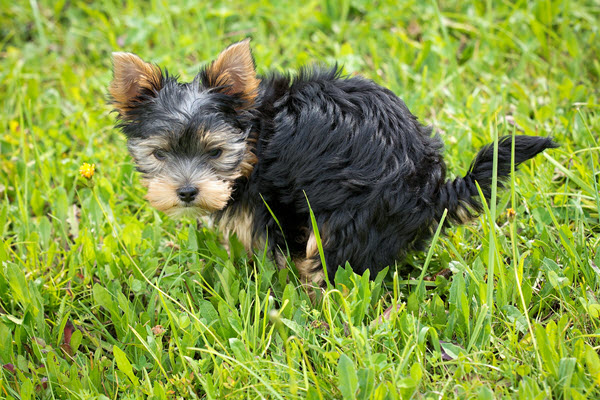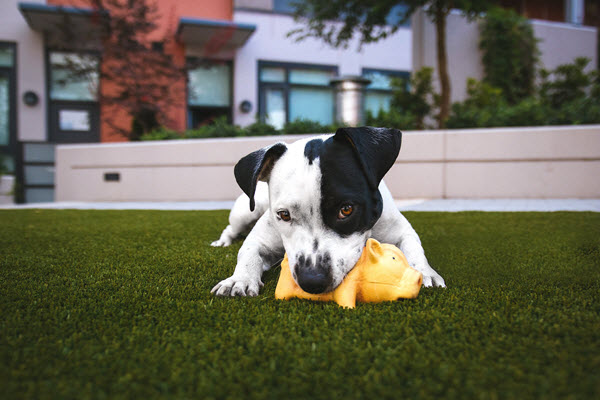Everybody poops — me, you, and our furry friends.
Most dog lovers are more familiar with dog poop than human poop. We scoop poop on walks, clean up indoor accidents, and search through mounds for lost treasures. Poop management isn’t everyone’s favorite part of pet parenthood, but it is a vital aspect of productive and health-focused pet care. As a result, pet parents shouldn’t be afraid to get up close and personal with their pup’s poop.
You can learn plenty while you’re tidying up Toto’s turds. If you don’t examine your dog’s poop frequently, make an effort to inspect a few piles every once in a while. Here’s what to look for when you’re at the scene of the crime.
A Healthy Dog Poop
Check the consistency, color, texture, and moisture levels. Healthy poop is “kickable.” You should be able to punt it over your fence and into a neighbor’s yard (please don’t, though). It should be firm yet soft— not runny or overly hard and dry.
Think about dog walkers: Someone who walks your dog should be able to quickly pick up any waste using nothing more than a plastic bag. The WALTHAM Scoring System is the gold standard. Ideally, your dog’s poop should land between a score of 2 or 3.
If any of those factors are different than normal — or if the frequency of your dog’s BMs changes drastically — then it’s time to investigate. Keep in mind: Even though your dog is one of a kind, you should strive for consistently boring poop.
Poop Cues

Loose stools can be a sign that your pup is overindulging. Fido’s diet might be too high in fat, which could mean he’s sneaking table scraps or enjoying too many treats. Similarly, eating out of the garbage can cause diarrhea and gas. Changing food can also cause loose stools, so it’s best to transition slowly between the old and new foods over the course of a week.
Your dog also could be stressed. If your dog’s poop is runny or watery, he or she probably ate something new or something inedible. Sometimes, runny poop can be a sign of a virus, parasite or bacterial infection.
But what does it mean if your dog is backed up or has hard, small poop?
It could mean that Rover ate a toy, a shoe or a sock that might be blocking his intestines. Puppies are particularly susceptible to eating strange objects that cause blockage problems.
Hard poop can also be a sign that your dog has a low-fiber diet, dehydration, full anal glands or just that your dog needs more time to run around. Exercise stimulates the colon and gets things moving inside.
Get to the Vet
If you see any of the issues listed above, how do you know when you should go to the vet and when to wait it out? If you notice any of the following signs in addition to unusual poop, it’s time for an appointment.
Bloody stool: Blood in the stool can be red (indicating a lower colon issue) or black (indicating an upper intestinal issue). This likely means there’s an underlying concern that your veterinarian needs to address.
Persistent runs: Seemingly endless runny poop might be a sign of a bacterial, parasitic or viral infection. Get to your vet right away because dehydration can set in quickly, especially in smaller dogs.
Worms: If you see worms or eggs in your dog’s poop, he or she might have worms. Your pup will be OK, but you’ll want to get some medication from the vet — stat.
Surprises: If your pup passes a foreign object such as string, wood, or bone, there could be more to come. The worry, of course, is damage to his or her intestinal tract and possible blockage that needs surgery. What else did your dog eat?
Constipation: Prolonged poopless periods could indicate a blockage which is a serious concern. Straining can lead to more complications, so you’ll want to call your vet if your dog hasn’t pooped in a few days.
Accompanying symptoms: If your pup won’t eat or drink, has a fever, is lethargic, vomits, pants or whines while trying to poop, get to the vet. Look for a 24-hour clinic if your regular vet’s office is closed. Emergency clinics are less expensive than you think, and waiting might do more harm.
Wait and See
Your dog’s poop is an indicator of what’s going on in his or her body, but it’s not always something problematic. You probably don’t have to go to the vet for the following cases:
Otherwise hungry/happy puppy: You might notice some irregular poop, but your pup is still eating and playing as usual. Keep an eye out for other signs of illness, but it’s probably nothing more like when a human is having a bad stomach day.
Anticipated distress: Your dog might have occasional loose stools. See if you can trace it back to, say, a thunderstorm or a visit from relatives. Consider whether your furry friend has eaten too many table scraps. Your dog also might be eating too many treats.
Medication- or food-induced: Runny poop after antibiotics or a deworming treatment are common. It’s also fairly normal after a food change. In these cases, giving dog-specific probiotics for a week or so might help.
If your dog’s poop is a bit off but you don’t sense anything serious, try some home remedies. Feed Fluffy unflavored canned pumpkin to firm up loose stool. Wet food and yogurt can loosen hard stools. If she is not drinking, try giving her some unsalted soup stock or bone broth.
Remember, never give Pepto-Bismol or laxatives to your dog. Just stick to pet-specific medications.
An Ounce of Prevention, a Pound of Perfect Poop

To get the most out of your dog’s digestive tract, here are a few things you can do:
- Provide plenty of water and change it daily.
- Don’t let dogs drink from puddles or ponds.
- Secure garbage and anything else your dog might think is a toy.
- Teach guests and children not to give table scraps or excessive treats.
- Buy appropriate dog toys — no rawhides, roasted bones or cooked bones.
- Regularly check for fecal worms, and vaccinate as recommended by your vet.
- Transition to new foods slowly.
- Ease storm anxiety with a ThunderShirt.
- Hire an in-home pet sitter for long trips to reduce anxiety. Remember, kennel stress is real — new smells, new dogs, and a new environment are also stressful.
Perfect poop makes for a happy pup. Staying vigilant about your pup’s poop can give you early clues about their health and keep them happier for longer.
See Also: Is Your Dog In Pain? Here’s How To Know For Sure
The post Wish Your Pup Could Tell You How He’s Doing? Check His Poop appeared first on Dumb Little Man.
from Dumb Little Man - Tips for Life http://bit.ly/2HwI5hj

No comments:
Post a Comment